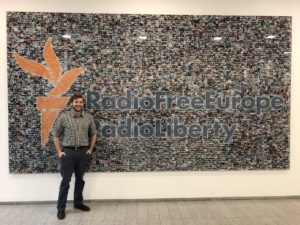Few institutions I’ve known illicit a wider range of reactions than Radio Free Europe/Radio Liberty. In my short few months there, I’ve had Prazaks (Prague locals) tell me everything from how thankful they are for my help in fighting dictators, to being told that I’m a CIA asset. The truth, understandably, is somewhere in the middle.
Radio Free Europe and Radio Liberty, once separate organizations, broadcast anti-communist propaganda into the former Soviet Union and its satellites via CIA funding (now Congress funds RFE/RL). For many, particularly older Czech citizens, listening to RFE/RL was not only their only window into the “West,” but an act of rebellion. Though the Soviet Union has faded into the annals of geopolitical strife, its shadow remains over much of RFE/RL’s 22-country region. With the weakening of democracy and rise of oligarchs across the region, RFE/RL’s mission is as important now as it was in 1991.
As the Media and Public Affairs Intern, it’s my job to help boost the visibility of the great work RFE/RL’s journalists do day in and day out. I write press releases, monitor our reporting for awards and mentions in other media, and issue “Kudos” on our website to RFE/RL journalists who have made an impact. This work not only allows me to become more intimately familiar with the work done by our correspondents, it enables me to give credit where credit is due: to our innovative, insightful, and dedicated correspondents who often put themselves in dangerous situations to tell important stories.
With great journalism often comes great risk to our reporters in countries that lack press freedom rights. As such, it is another part of my role to keep up on “Journalists in Trouble” and help report their stories, and the stories that got them into said trouble, to a wider audience. In just the few months, RFE/RL reporters have been harassed and arrested, banned by government officials, and killed in the line of duty. These harsh realities face journalists worldwide but often go underreported. This is why my colleagues and I created the “Journalists in Trouble” newsletter. The bi-weekly newsletter keeps influencers and policy makers across the globe informed on threats to journalists, regardless of their station affiliation. A threat to press freedom anywhere is a threat to press freedom everywhere.
In my final coming weeks, I will continue to work on “Journalists in Trouble,” issue press releases, and edit work from writers who aren’t native English speakers. My final project is a collaborative effort between our department and the country bureaus on the thirtieth anniversary of the Czech Velvet Revolution and other revolutions in 1989. Though I will be back in Syracuse when published, I will assist in building the foundation for this microsite and remind people of the great work RFE/RL has been doing in Central and Eastern Europe for decades.
It has been an incredible opportunity to work with and learn from the professionals at RFE/RL and one that has taught me to be all the more appreciative of our press freedom in the United States. People cannot make informed decisions to benefit their communities if they aren’t given the proper information and context. Radio Free Europe celebrate its 70th anniversary this year and given the incredible work I’ve seen in just a few months, I feel confident they’re just getting started.
Eric Baker is a joint MAIR/MSPR student at the Maxwell and Newhouse Schools. He will be completing his degree at the Maxwell Schools Washington DC program with an internship at Albright Stonebridge Group.

